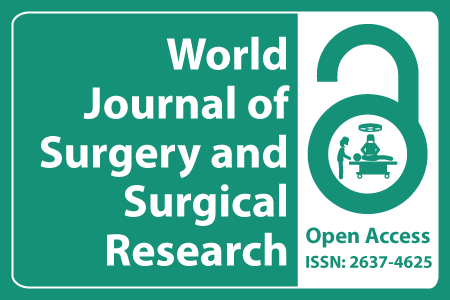
Journal Basic Info
- Impact Factor: 1.989**
- H-Index: 6
- ISSN: 2637-4625
- DOI: 10.25107/2637-4625
Major Scope
- Hepatology
- Trauma Surgery
- Anesthesiology
- Cardiovascular Surgery
- Ophthalmology & Eye Surgery
- Orthopaedic Surgery
- General Surgery
- Gastroenterological Surgery
Abstract
Citation: World J Surg Surg Res. 2020;3(1):1240.DOI: 10.25107/2637-4625.1240
Endocrine Surgery Training in the United Kingdom: A Survey of Higher Surgical Trainees
de Jong MC1*, Christakis I2, Mihai R1 and Khan S1
1Department of Endocrine Surgery, Oxford University Hospitals NHS Foundation Trust, UK
2Department of Surgery, Nottingham University Hospitals NHS Trust, UK
*Correspondance to: Mechteld de Jong
PDF Full Text Research Article | Open Access
Abstract:
Aim: To analyze the current perceptions of higher surgical trainees in the United Kingdom
regarding individual exposure and experience in endocrine surgery.
Methods: A web-based questionnaire was distributed amongst higher general surgical trainees in
the UK, inquiring about their current exposure and the expected numbers of procedures performed
by the end of their training.
Results: The questionnaire was returned by 131 higher surgical trainees. While the numbers for
thyroid [range: 1 to 40] - and parathyroid [range: 1 to 30] procedures performed were variable,
the exposure to laparoscopic/open adrenalectomy or neck dissections was poor (overall <10 cases
performed during training). Overall, trainees felt their current exposure to fall short of the numbers
they considered needed for reaching competency. After excluding those trainees with no prior
experience in endocrine surgery, over 95% of responders (n=88/91; 96.7%) felt that indicative
numbers should be set, to guide them in their training. Furthermore, overall 120 of the responders
(91.6%) felt a fellowship in endocrine surgeon was necessary to obtain the required skills.
Conclusion: This survey showed that trainees expressed a desire for establishing indicative numbers
of endocrine operations to have been performed by the end of their surgical training, albeit no
guidance towards the exact numbers for achieving competences could be set. Moreover, the role
of designated endocrine surgery fellowships seemed to be broadly
Keywords:
Endocrine Surgery; Training; Survey
Cite the Article:
de Jong MC, Christakis I, Mihai R, Khan S. Endocrine Surgery Training in the United Kingdom: A Survey of Higher Surgical Trainees. World J Surg Surgical Res. 2020; 3: 1240..













